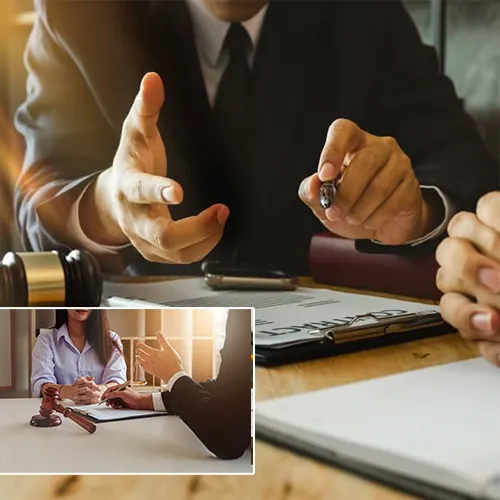Essential Guide: Recording DUI Traffic Stops Legally
Table of Contents []
Recording DUI Traffic Stops
Welcome to Bain Lee Norton: Your Guide to Recording DUI Traffic Stops

In an age where transparency and legality go hand in hand, recording DUI traffic stops has become an essential practice for protecting individual rights and ensuring due process. At Bain Lee Norton, we're dedicated to educating you on the legalities and best practices associated with documenting these critical interactions. Knowing how to properly record an encounter with law enforcement can make all the difference in your favor, should any questions arise about the event. Let us help you stay informed and prepared.
Whether you're a driver, a concerned passenger, or simply a citizen curious about your rights, this guidance will arm you with the knowledge needed to confidently manage a traffic stop situation. With our advice and access to legal professionals who are experts in leveraging such evidence, you'll not only understand your rights but also how to exercise them responsibly.
Why Record a DUI Traffic Stop?
Creating an Objective Record: Memory can be fickle, and perspectives can differ. Recording creates an objective account of what transpired during a traffic stop, which can be invaluable in court or during a dispute.
Holding Parties Accountable: With a recording, both the officer and the driver have a clear incentive to follow the law. It's about making sure that everyone involved complies with legal standards.
Understanding Your Legal Rights
It's critical to know that as a citizen, you have the right to record public officers while they are performing their duties in a public place. This includes recording your own traffic stops, as long as you're not physically interfering with the officer's work.
However, laws can vary by state, and it's important to stay informed about the specific regulations that apply to where you live or where you're traveling.
Best Practices for Recording
Be Respectful and Safe: Although you have a right to record, it is important to be respectful and not obstruct law enforcement duties. Ensure your actions are safe and do not escalate the situation.
Inform the Officer: While it's not always required, informing the officer that you are recording can be beneficial. It establishes transparency and can sometimes encourage a more professional interaction.
How to Properly Record an Encounter
When you start recording, do so discretely but clearly. Make sure the recording device is in a stable position to capture both audio and video effectively. Remember, these recordings can be significant evidence, so clarity is paramount.
Also, be mindful not to speak over the officer or the recording. If you must speak, speak clearly and concisely. Your goal is to document, not to dominate the conversation.
Expert Legal Insight on Recording DUI Stops by Bain Lee Norton

At Bain Lee Norton, we don't just provide advice; we offer the support of experienced legal professionals who understand the profound impact that a well-documented traffic stop can have on legal proceedings. The use of recordings during DUI stops cannot be overstated-it has the potential to make or break a case. That's why understanding how to properly record these interactions, and how to use them afterward, is absolutely crucial.
Let's delve deeper into what the experts advise concerning recording these critical moments. Through our insights, you will be better prepared to handle recording DUI traffic stops, which could serve as a powerful tool in safeguarding your legal interests.
The Importance of Evidence in DUI Cases
Clarity of Events: Recordings can provide a clear sequence of events that might contradict inaccurate statements or reports, offering a stronger defense in DUI cases.
DUI cases often hinge on the details. Recorded evidence can illustrate the circumstances surrounding a field sobriety test or interactions leading up to an arrest.
Preserving Your Recording
After recording, it is imperative to properly save and back up the footage. Losing this evidence could mean losing a key piece of your defense. It's best to have multiple backups in different locations, like cloud storage or an external hard drive.
Furthermore, reaching out to a legal professional promptly to review the recording can help determine its value and how it should be presented legally.
Utilizing Recordings in Legal Proceedings
Using your recording effectively requires a nuanced understanding of the law. That's where our experienced legal professionals step in. They can help you navigate the complexities of legal proceedings with the recordings as a foundation for your defense strategy.
Analysis and Expert Testimony: In some cases, expert witnesses may analyze the recordings and provide testimony that supports your case. This analysis can often unravel incorrect assumptions or highlight procedural errors made during the traffic stop.
When to Reach Out to Legal Aid
Directly after the encounter, it's wise to consult with legal aid. The more swiftly you act, the fresher the details and the more robust your defense can be. At Bain Lee Norton, we're ready to assist you in taking the right steps forward.
Call (512) 686-4293 for a consultation and allow us to guide you through the legal nuances of your recording.
Bain Lee Norton's Approach to Educating on Recording Rights

Our mission at Bain Lee Norton extends beyond just legal advice and includes comprehensive education on recording rights during DUI traffic stops. Knowledge is power, and our goal is to empower our readers and clients with the know-how to document these crucial encounters safely, respectfully, and in compliance with the law.
Let's break down the essentials of what you need to understand and remember about your rights and the optimum ways to record a DUI traffic stop.
Know Your State's Laws
Laws regarding recording on public property, and specifically during police encounters, can vary from state to state. We help you understand these laws so that you are never caught unprepared.
Always check the current regulations in your state before making the decision to record. If in doubt, reach out to us for clarification.
Staying Secure and Legal
Recording can protect you, but it's crucial to do it in a way that doesn't violate any laws or endanger anyone. We guide you through the maze of legal requirements to keep you on safe ground.
Remember, your safety and that of those around you is paramount, and ensuring a calm interaction with law enforcement should always be a top priority.
Documenting Without Confrontation
Recording shouldn't be a weapon or a form of provocation. Instead, it should be a silent witness to the truth. We educate on how to record with minimal disruption and avoid any potential conflicts that could exacerbate the situation.
Understanding how to maintain a polite dialogue while exercising your rights is a delicate balance, but it's one that can be achieved with the right guidance.
Protecting Your Footage
We cannot overstate the importance of protecting the footage you capture. Encrypting and securely storing your recordings ensures they remain intact and can serve their purpose if required in a legal setting.
Always have contingency plans for storing your videos, and never rely on just one copy or one method of storage.
Bringing It All Together: Bain Lee Norton supports Recording DUI Traffic Stops Nationwide

At Bain Lee Norton, we stand firmly behind the belief that recording DUI traffic stops is a powerful tool for upholding justice and ensuring everyone is treated fairly under the law. Armed with knowledge, a sound recording strategy, and the backing of our legal experts, you can approach these situations with confidence.
Remember, if you're facing a situation where the legality of your traffic stop is in question, don't hesitate. Call us at (512) 686-4293. Our team is ready to lend their expertise and help you navigate your case with the support of solid evidence. With Bain Lee Norton, rest assured you're not alone in advocating for your rights. Let us be your guide and ally in achieving just and fair outcomes in DUI traffic stop situations.
Contact Us for Personalized Advice
Each traffic stop scenario is unique, which is why personalized advice is so crucial. Reach out to Bain Lee Norton to share your specific situation, and gain expert insight tailored to you.
Contact us anytime for assistance. Our comprehensive understanding of the legal aspects of DUI traffic stops makes us your go-to resource for reliable support.
Booking a Consultation with Experts
A consultation with one of our legal experts can set the stage for a successful defense, should you need it. We can provide you with action steps and strategies specific to your case.
Don't wait until it's too late. Booking a consultation early on can make all the difference. Call (512) 686-4293 and schedule yours.
Immediate Help Available
If you've just had a traffic stop encounter and are unsure about the next steps, Bain Lee Norton is here for you. Give us a call right away for immediate advice and support.
Our team is ready to assist you at a moment's notice, ensuring you receive the guidance you need, exactly when you need it.
Take action now by calling (512) 686-4293 and secure the professional expertise of Bain Lee Norton in your corner. Together, we can work towards ensuring legal compliance and protecting your rights during DUI traffic stops. Don't hesitate, reach out today!
Previous Page

